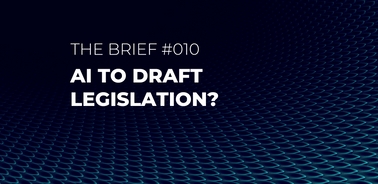- Home
- News And Events
- News
- The Brief #010 Ai To Draft Legislation?
THE BRIEF #010 AI to draft legislation?

IN BRIEF
A variety of AI tools have been developed to bring parliaments closer to citizens and help members of the legislative branch better collect information. In addition, some countries have begun to use AI to directly draft legislation.
THE GIST
Two countries stand out regarding the use of AI to help write new legislation: the United Arab Emirates (UAE) and Albania.
The UAE aims to use AI to help write new legislation and review existing laws. This approach differs from other governments, which have used the technology mainly for efficiency, from summarizing bills to enhancing public service delivery. The UAE has estimated that this initiative could accelerate lawmaking by 70% because of the automation of key stages of the legislative process. Additionally, it can be cost-effective, as governments often pay law firms to review legislation.
In Albania, the government is working with AI to help align its national legislation with EU standards. Albania’s Prime Minister, Edi Rama, has described using AI in this process as a key accelerator in the country’s EU accession. Prime Minister Rama has claimed: “To transpose the EU legal corpus, even mechanically, into the national legislative corpus would require an army of translators, drafters and law writers, and many other people (…). We want to do it faster. We are creating a model that not only transposes in real time but also gives us compliance with our legislation.” Albania’s Ministry of Justice also uses AI to identify and resolve legal overlaps, significantly streamlining the integration of EU directives into Albania’s legal framework.
THE TAKEAWAY
It has not become uncommon for legislators and policymakers have used AI tools in recent years to draft legislative bills. For example, in 2023, the U.S. Representative Ted Lieu from California introduced the first congressional resolution written by Chatgpt. Likewise, that same year, some lawmakers of the Costa Rican Congress used Chatgpt to draft a bill aimed at regulating AI systems. In both cases, the representatives wanted to symbolically demonstrate some of AI's potential strengths (but also risks).
However, both the cases of the UAE and Albania show that governments, and not just individual politicians, are outsourcing some functions, usually held by lawyers or elected members of parliament, to AI models. Rony Medaglia, professor at the Copenhagen Business School, has argued that in the case of the UAE, it appears that the initiative wants to turn AI into “some sort of co-legislator.” With the rapid development of AI capabilities and its ongoing implementation in different legislative practices, could AI systems perform the functions of a parliamentarian better than a human representative? If so, what does this mean for democratic parliaments? Would citizens be more inclined to prefer an AI drafting laws than a human member of parliament?
A survey published by the CGC in 2021 found that 51% of Europeans would support replacing parliamentarians with AI algorithms. Although this is still to be discussed, some experts remain skeptical and cautious about using AI to develop legislation. Vincent Straub, a researcher at the University of Oxford, has warned that AI models “continue to hallucinate” and have “reliability and robustness issues.”
The two pioneering examples of the UAE and Albania should provide a first indication of whether works to develop legislation can be effectively outsourced to AI. It will be important to monitor and evaluate the results and quality of the laws drafted by AI in these two countries. Ultimately, it is up to each citizenry to decide democratically on their methods of lawmaking and limits to the use of technology in their democratic processes.
DELVE DEEPER
IE University research reveals 1 in 2 Europeans want to replace national MPs with robots (IE University). This article shows that over half of Europeans would consider replacing national MPs with AI, highlighting a surprising openness to the use of tech in politics.
Enhancing legislative engagement with AI (Center for the Governance of Change) – Nathan Sanders and Matthew Victor (MAPLE) and Alicia Combaz and David Mas (Make.org). This paper examines how AI can enhance participation in the legislative process by helping citizens become more informed about it and more involved in shaping policy. It also addresses how different AI tools can help legislators be better connected with and more responsive to the communities they represent.
UAE set to use AI to write laws in world's first (Chloe Cornish, Financial Times). This article describes the UAE’s plans to use AI to draft, review and amend laws, aiming to speed up lawmaking and improve accuracy. Experts call the move bold but caution against risks like AI bias, reliability issues and misinterpretation of laws, stressing the need for strong human oversight.